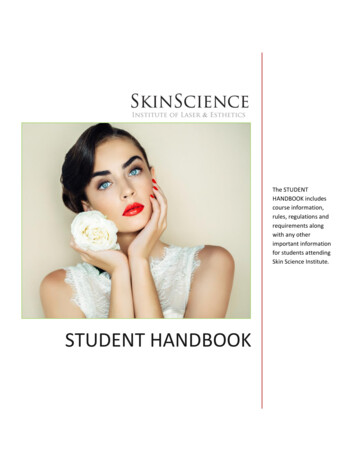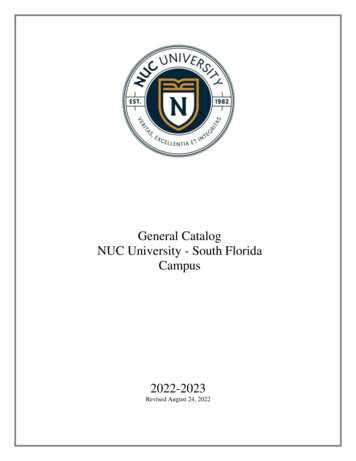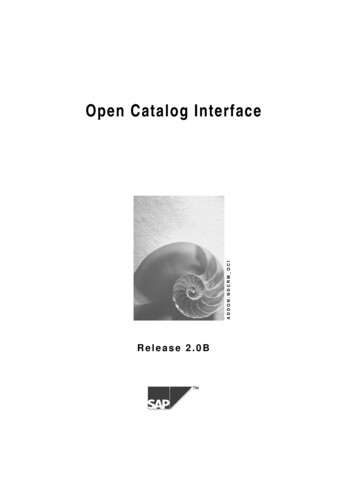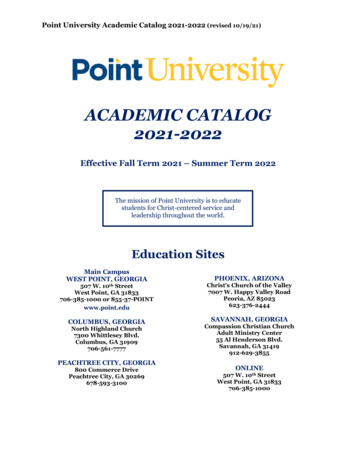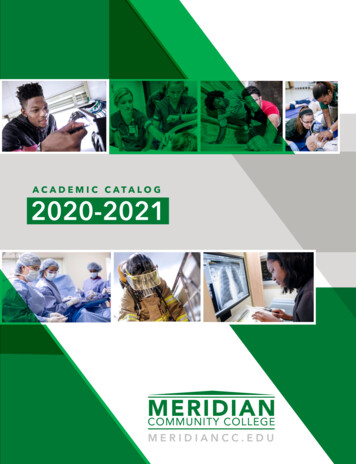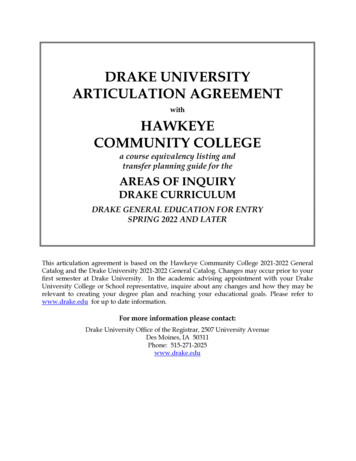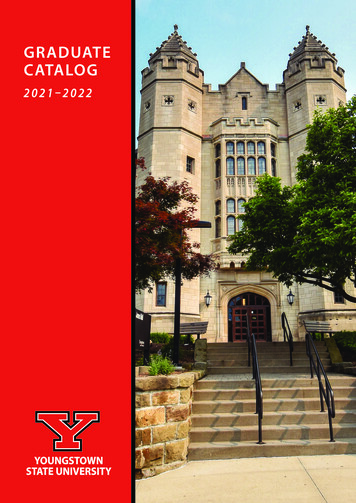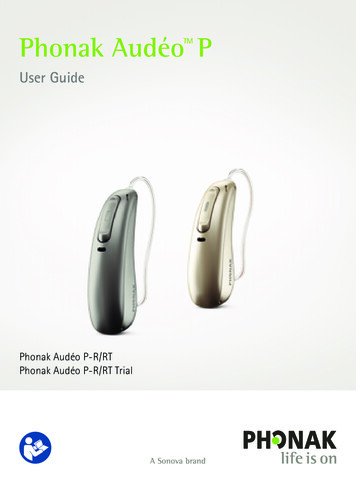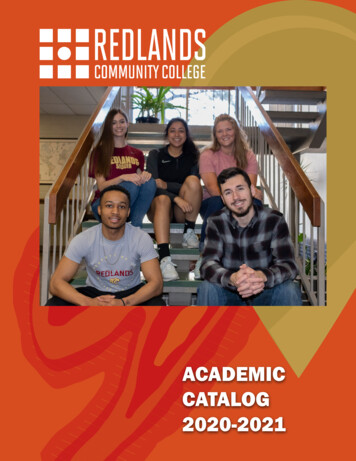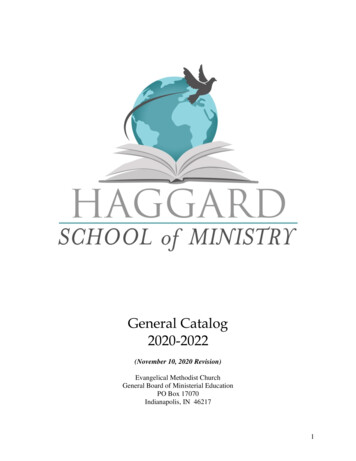
Transcription
General Catalog2020-2022(November 10, 2020 Revision)Evangelical Methodist ChurchGeneral Board of Ministerial EducationPO Box 17070Indianapolis, IN 462171
General CatalogHaggard School of MinistryEvangelical Methodist ChurchTHE HAGGARD SCHOOL OF MINISTRYThe Haggard School of Ministry was established by the Evangelical Methodist Church in 2012and is named after Dr. Cornelius P. Haggard, the 13th President of Azusa Pacific College, nowAzusa Pacific University. Dr. Haggard was a highly respected academician, theologian, and akey leader in the earliest days of the Evangelical Methodist Church. It was his commitment totheological education and ministry that the Church sought to memorialize in the naming of theHaggard School of MinistryHSOM operates under the supervision of the General Board of Ministerial Education and isresponsible for appointing a dean, overseeing curriculum development, securing and approvingacademically qualified faculty, approving operational policies, qualifications for admissions, andtuition and fees where applicable.MISSION STATEMENTThe mission of the Haggard School of Ministry is to prepare and equip candidates for ministry inthe Evangelical Methodist Church for service to the kingdom of God.GOALSWhen undergraduate and/or graduate theological education is not possible, the Haggard Schoolof Ministry provides quality preparatory ministerial education to candidates seeking to answerGod’s call to Christian service. Our goals are:1. To provide academic courses that will enable ministerial candidates to gain proficiency ingeneral education, Bible, theology, and pastoral ministry,2. To provide students with the biblical, theological, and practical skills necessary toperform the ministerial tasks to which they have been called,3. To instill in candidates a commitment to Christ-like living,4. To inspire candidates to embrace Wesley’s vision for worldwide evangelism, The World,My Parish.2
OBJECTIVESUpon the completion of this program of study a student is expected to:1. Have a deeper and more complete understanding of biblical, theological, practicalministry subjects,2. Be competent to exegete and communicate biblical and theological truth through pastoralministry methods,3. Gain a deeper understanding of the claims of Christ on a sin-laden world and possess apassion to share those claims,4. Be competent in the pastoral/practical skills necessary to perform professional ministrytasks and expectations.HSOM ADMISSIONSEMC Conference Superintendents and the General Board of Ministerial Relations (GBMR)interview interested candidates for ministerial credentials. Credential candidates desiring toenroll in the Haggard School of Ministry must be approved to do so by the GBMR.Optional programs of study include Elder, Local Preacher, and Deacon/Deaconess. The LayExhorter Program of Study is open to any church member with a letter of reference from thelocal pastor and/or a recommendation from the Annual Church Conference.For persons interested in taking HSOM courses for “Personal Enrichment” we welcome EMCcongregants 18 years of age or older, with a high school diploma or equivalent, to makeapplication. All courses are taught at the undergraduate (college) level and may count foracademic credit at Ohio Christian University.You may access an application by clicking here: Haggard School of MinistryFor more information please contact the HSOM Dean at bdonley@northstate.net.RECOGNITIONSThe Haggard School of Ministry is a ministerial preparatory program of study for personsinterested in pursuing ministries within the Evangelical Methodist Church but who do not havean undergraduate degree. HSOM is not regionally or nationally accredited. It is hoped however,that by the utilization of academically qualified faculty, professionally developed courses, andrigorous course requirements, undergraduate institutions might recognize the quality of theeducation offered and provide appropriate undergraduate credit.LIBRARY AND ACADEMIC RESEARCHThe Haggard School of Ministry does not possess a library. Students will use online resources,local libraries, church libraries, and where possible ask for borrowing and research privilegesfrom local colleges, universities, or theological schools.3
PROGRAMS OF STUDYElders Orders Program of StudyElders Orders through the Haggard School of Ministry (HSOM) are listed below and can becompleted in two years of full-time enrollment.General EducationGE101a & b—Developing a Christian Worldview—(3 Sem Hrs)--OnlineBibleBI101—Bible Study Methods—(3 Sem Hrs)--OnlineBI102—Hermeneutics—(3 Sem Hrs)--OnlineBI103—Old Testament Survey—(3 Sem Hrs)--OnlineBI104—New Testament Survey—(3 Sem Hrs)--OnlineBI201— Pentateuch—(3 Sem Hrs)--Resident EMC HqsBI202— Romans—(3 Sem Hrs)--Resident EMC HqsHistoryHI101—This Is The EMC—(1 Sem Hr)—Online/JourneyHI102—Church History Survey—(3 Sem Hrs)--OnlineTheologyTH201—Theology of Music in Worship—(3 Sem Hrs)--OnlineTH202—Theology of John Wesley—(3 Sem Hrs)--OnlineTH203—Theology I—(3 Sem Hrs)--Resident EMC HqsTH204—Theology II—(3 Sem Hrs)--OnlinePractical MinistryPM101—Homiletics—(3 Sem Hrs)--Resident EMC HqsPM102—Spiritual Formation—(3 Sem Hrs)--OnlinePM203—Pastoral Care and Counseling—(3 Sem Hrs)--OnlinePM204—Evangelism and Discipleship—(3 Sem Hrs)--OnlinePM205—Mentoring for Ministry—(6 Sem Hrs)*PM206—Pastoral Life and Ministry—CEU4
ACADEMIC REQUIREMENTS FOR OTHER CREDENTIALED MINISTRIESLocal Preacher Program of StudyLocal Preachers will complete the following courses:BibleBI101—Bible Study Methods—(3 Sem Hrs)--OnlineHistoryHI101—This Is The EMC—(HSOM)—Online/JourneyTheologyTH101—Basic Bible Doctrine—(3 Sem Hrs)--OnlineTH203—Theology I—(3 Sem Hrs)--Resident EMC HqsPractical MinistryPM101—Homiletics—(3 Sem Hrs)--ResidentPM202—Pastoral Care & Counseling—(3 Sem Hrs)--OnlinePM204—Evangelism & Discipleship—(3 Sem Hrs)--OnlineLocal Preachers may choose to pursue Elders Orders at a later date and would completethe remaining courses listed in the Elders Orders Program of Study listed above.Deacon/Deaconess Program of StudyBibleBI101—Bible Study Methods—(3 Sem Hrs)--OnlineHistoryHI101—This Is the EMC—(1 Sem Hr)—Online/JourneyTheologyTH101—Basic Bible Doctrine—(3 Sem Hrs)--OnlinePractical MinistryPM203—Pastoral Care & Counseling—(3 Sem Hrs)--Online5
Lay ExhortersLay Exhorters are licensed by the Annual Church Conference, or by a Special Conferenceand may assist the pastor in preaching and pastoral responsibilities at the discretion of thepastor and church leadership. Although there are no academic requirements for licensure,Lay Exhorters may choose to enroll in the following courses to enhance their abilities andgifts in ministry.BibleBI101—Bible Study Methods—(3 Sem Hrs)--OnlineHistoryHI101—This Is the EMC—(1 Sem Hr)—Online/JourneyTheologyTH101—Basic Bible Doctrine—(3 Sem Hrs)—OnlinePractical MinistryPM101—Homiletics—(3 Sem Hrs)—Resident EMC HqsPM202—Pastoral Care and Counseling—(3 Sem Hrs)--Online6
CREDENTIAL CANDIDATE POLICIESThe Haggard School of Ministry (HSOM) provides Programs of Study for candidates seekingcredentials in the Evangelical Methodist Church.EMC credential candidates are encouraged to pursue undergraduate and graduate degrees atEMC approved institutions (see list of EMC Approved Undergraduate Institutions).EMC credential candidates without an undergraduate degree will enroll in HSOM and follow theprescribed Resident and Online curriculum for their chosen “Program of Study” (see below).POLICIES REGARDING CANDIDATES FOR ELDERS ORDERSElders Orders candidates will complete HI101—This Is The EMC, taught annually.Elders Orders candidate without an undergraduate degree will be interviewed by the GeneralBoard of Ministerial Relations and will enroll in the Haggard School of Ministry (HSOM)Elders Orders candidates with a bachelor’s degree from an approved college/university will beinterviewed by the General Board of Ministerial Relations to insure preparedness for ministerialservice and Admission on Trial. (Candidates may be required to take additional courses in theHSOM).Elders Orders candidates with a bachelor’s degree from non-approved colleges/universities willbe interviewed by the General Board of Ministerial Relations before enrolling in the HaggardSchool of Ministry (HSOM).Elders Orders candidates with graduate degrees from approved seminaries or schools of theologywill be interviewed by the General Board of Ministerial Relations before being recommended forAdmission on Trial.Elders Orders candidates with graduate degrees from non-approved seminaries or schools oftheology will be interviewed by the General Board of Ministerial Relations and one member ofthe General Board of Ministerial Education. A determination by the GBMR will be maderegarding the candidate’s commitment and preparedness for service in Wesleyan-Arminianchurches. Elders Orders candidates may be required to pursue further theological study atHSOM.POLICIES REGARDING CANDIDATES FOR LOCAL PREACHER LICENSELocal Preacher candidates will be interviewed and approved by the General Board of MinisterialRelations prior to enrollment in the Local Preacher Program of Study.Local Preacher candidates with or without an undergraduate degree will enroll in the HaggardSchool of Ministry Local Preacher Program of Study and complete all required courses prior torecommendation for licensure.7
POLICIES REGARDING CANDIDATES FOR DEACON/DEACONESS ORDERSDeacon/Deaconess candidates will be interviewed and approved by the General Board ofMinisterial Relations prior to enrollment in the Deacon/Deaconess Program of Study.Deacon/Deaconess candidates with or without an undergraduate degree will enroll in theHaggard School of Ministry Deacon/Deaconess Program of Study and complete all requiredcourses prior to recommendation for orders.POLICY ON PLAGIARISMThe following statement on plagiarism is an excerpt from the Council of Writing ProgramAdministrators.What Is Plagiarism?In instructional settings, plagiarism is a multifaceted and ethically complex problem. However, ifany definition of plagiarism is to be helpful to administrators, faculty, and students, it needs tobe as simple and direct as possible within the context for which it is intended.Definition: In an instructional setting, plagiarism occurs when a writer deliberately usessomeone else’s language, ideas, or other original (not common-knowledge) material withoutacknowledg-ing its source.This definition applies to texts published in print or on-line, to manuscripts, and to the work ofother student writers.Most current discussions of plagiarism fail to distinguish between:1. submitting someone else’s text as one’s own or attempting to blur the line between one’sown ideas or words and those borrowed from another source, and2. carelessly or inadequately citing ideas and words borrowed from another source.Such discussions conflate plagiarism with the misuse of sources.Ethical writers make every effort to acknowledge sources fully and appropriately in accordancewith the contexts and genres of their writing. A student who attempts (even if clumsily) to identifyand credit his or her source, but who misuses a specific citation format or incorrectly usesquotation marks or other forms of identifying material taken from other sources, has notplagiarized. Instead, such a student should be considered to have failed to cite and documentsources appropriately. (www.wpacouncil.org)HSOM students found guilty of plagiarism will be referred to the HSOM Dean for appropriateaction as deemed necessary and may be referred to the General Board of Ministerial Relationsfor ethical misconduct.8
POLICY ON RESEARCH PAPER WRITING STYLEAll research papers assigned by faculty members will use The Chicago Manual of Style, 17thEdition, (sometimes referred to as the Turabian Style). Faculty members, at their discretion, mayallow modifications to this writing style. Students may familiarize themselves with this writingstyle at the following link: Purdue Online Writing LabAll written work will be formatted as follows unless instructed otherwise by a faculty member.Formatting Guidelines1. Font Times New Roman2. Font size 12 point3. Spacing double space4. Margins 1 ½ " left, 1” right, 1” top and 1” bottom5. Page numbering - style and location, bottom rightPOLICY ON ETHICAL BEHAVIORThe Haggard School of Ministry is an educational endeavor preparatory to various ministryvocations. It is expected that students enrolled in HSOM will commit themselves to the higheststandards of Christian ethical behavior. HSOM enrollment assumes that students will avoidcheating, plagiarism, falsehoods, and in communication with fellow students, faculty, and staffwill communicate in a respectful, courteous, and godly manner.Policy on Remedial EnglishStudents whose written English skills are deemed deficient may be asked to complete aDevelopmental Writing course through Straighterline.com or other comparable programs (seeHSOM application form). Click here to be directed to Straighterline.comA separate tuition fee for this course is the responsibility of the student and is paid directly toStraighterline.9
GRADING SYSTEM AND QUALITY POINTSGrade PercentagePointsA96-1004.0A94-953.7B 92-933.3B88-913.0B86-872.7C 83-852.3C80-822.0C77-791.7D 74-761.3D70-731.0D67-69.7F66 or below0.0Pass70 or aboveNoneFailbelow 70NoneVWDWithdrew, never attendedVWPWithdrew passing with acceptable gradesINCIncomplete, under exceptional conditionsstudent is allowed to complete course within atime negotiated between the HSOM Dean, Professor,and student.2020-2022 TUITION AND FEE POLICIESTuition PlansCredentialCourses RequiredDeacon/Deaconess4Local Preacher7Elders20Tuition 675 1,350( 2,025 per year) or 4,050 totalTuition for students needing only individual courses to complete credential requirements will pay 225 per course.Payment plans can be arranged by contacting the Registrar at (317) 780-8017 or by email atgeneralsecretary@emchurch.orgTranscripts will not be released to the General Board of Ministerial Relations or any other entityuntil tuition has been paid in full.10
Financial Policies Course syllabi will be released by the HSOM Dean when financial arrangements with theRegistrar have been satisfied.If a student pays annual tuition fees and fails to complete a course in eight weeks, or failsto enroll in any of the offered courses there will be no refund.If a student paying annual tuition fees fails to complete the course in the allotted eightweeks the student will be charged an additional 50 until all work is completed. Thestudent must complete the course within the year or re-enroll in the course the followingyear with a 75 tuition assessment.If a student paying annual tuition fees fails to enroll in a course the student will berequired to take the course the following year and will be assessed 75 for the coursemissed.If a student fails to complete a course within the prescribed timeframe (eight weeks), thestudent will be required to take the course the following year at the prevailing per courserate.11
Evangelical Methodist Church*List of Approved Higher Education InstitutionsApproved Undergraduate InstitutionsAnderson UniversityAsbury UniversityAzusa Pacific UniversityEastern Nazarene CollegeGreenville UniversityGod's Bible School and CollegeHobe Sound Bible CollegeHoughton CollegeIndiana Wesleyan UniversityKentucky Mountain Bible CollegeKingswood University (NB, Canada)Mid-America Christian UniversityMid-America Nazarene UniversityMount Vernon Nazarene UniversityNazarene Bible CollegeOhio Christian UniversityOklahoma Wesleyan UniversityOlivet Nazarene UniversityPillar CollegePoint Loma Nazarene UniversitySeattle Pacific UniversitySouthern Nazarene UniversitySouthern Wesleyan UniversitySpring Arbor UniversityTrevecca Nazarene UniversityWarner Pacific CollegeWarner UniversityApproved Seminaries and Schools ofTheologyAnderson School of TheologyAsbury Theological SeminaryEvangelical Seminary (Myerstown, PA)Kingswood University (NB, Canada)Mount Vernon Nazarene UniversityNazarene Theological SeminaryOhio Christian UniversityOklahoma Wesleyan UniversitySouthern Nazarene UniversitySouthern Wesleyan UniversityWesley Biblical SeminaryWesley Seminary at Indiana Wesleyan University*The GBME and GBMR will honor nationally and/or regionally accrediteddegrees from higher educational institutions not listed above but credentialcandidates may be required to take additional Bible and Theology coursesthrough HSOM.12
Course StructureNon-resident courses are designed as a three-semester hour undergraduate course unlessotherwise specified and incorporate a minimum of 128-144 hours of reading, quizzes, exams,reports, papers, class discussion, and instruction over a period of eight weeks. The instructorwill meet with the class via Skype, Facetime, Zoom or other visual communication platforms aminimum of once a week for six to eight weeks for lectures and/or group discussion of weeklyassignments. Students will engage in a minimum of six weekly online discussion forums with theinstructor and fellow students followed by an additional two weeks to complete research,reading, and writing assignments.Resident courses are designed as a three-semester hour undergraduate course (unless otherwisespecified), in a five-day intensive. Students will be given assignments prior to the residentialphase of the course as well as post-residential assignments incorporating a minimum of thirtyfive to forty hours of research, reading, and writing. Daily reading and writing assignments willbe expected during the weeklong residence instruction. Students should expect to completeadditional course assignments after the weeklong residence phase.One course, PM206—Pastoral Life and Ministry, is designed as a Continuing Education Unit(CEU), following two years of ministry. PM206 is worth one (1) CEU of 10 contact hours.Courses will ONLY be available at the prescribed dates listed in the Course Calendar below, theHSOM Dean must approve exceptions to this policy and a 100 fee will be added to the cost ofthe individual course. Exceptions will be granted for residential courses with the approval of theHSOM Dean.Writing Across the Curriculum will be a key component of every course. Proper sentence andparagraph construction, grammar, and language skills contribute to depth of knowledge, criticalthinking skills, and independent thought processes. Faculty members will evaluate all writtenassignments and provide useful comments and assistance to encourage qualitative writing skills.13
Course DescriptionsGeneral EducationGE101a & b—Developing a Christian Worldview—(6 sem hrs over two semesters)This is a basic orientation to training for Christian ministry. Its purpose is to introduce candidatesfor the ministry to the world of ideas today that challenge biblical truth. Candidates will compareChristian faith to secularism, the primary system of thought in secular education in Americatoday. The methodology involves the use of Focus on the Family’s “The Truth Project.” Thecourse is divided into two sections over a period of two semesters. The course is designed tobuild a systematic and comprehensive biblical framework by studying God’s blueprint for all oflife. GE101a will encompass six lessons, Veritology, Philosophy and Ethics, Anthropology,Theology, Science, and History. GE101b will encompass six lessons, Sociology, Unio Mystica,the State, the American Experiment, Labor, and Community and Involvement. (Required forElders)BibleBI101—Bible Study Methods—(3 sem hrs)Through the use of inductive Bible study methodology, students will learn the basic principles ofbiblical interpretation. Students will learn how to make observations, develop interpretivequestions, understand the nuances of figurative, symbolic, and literal language structure, andhow to make applications based on biblical principles. (Required for Deacon/Deaconess, LocalPreacher, Elder)BI102—Hermeneutics—(3 sem hrs)Advanced Bible study methods will be examined in this course. Special emphasis will be placedon contextual aspects, language, culture, literary forms such as parables, hyperbole, allegory,metaphor, poetry, etc. Students will use these methods of scriptural analysis to developtheological ideas, principles, and make meaningful applications to contemporary culture.(Required for Elder)BI103—Old Testament Survey—(3 sem hrs)This course encompasses three-fold emphasis to the texts of the Old Testament, an introductory,a core, and a hermeneutical emphasis. The introductory emphasis, focuses on items of a criticalnature such as authorship, dating, audience, and purpose are considered. The core emphasisfocuses on a study of the contents of the canonical text, its cultural background, and itsrelationship with the New Testament. The hermeneutics emphasis focuses on learning andpracticing an inductive approach to scriptures. (Required for Elder)14
BI104—New Testament Survey—(3 sem hrs)This course combines a basic introduction to the canonical New Testament with a study ofhermeneutics. The introductory emphasis, focuses on items of a critical nature such asauthorship, dating, audience, and purpose are considered. The core emphasis focuses on a studyof the contents of the canonical text, its cultural background, and its relationship with the OldTestament. The hermeneutics emphasis focuses on learning and practicing an inductiveapproach to scriptures. (Required for Elder)BI201—Pentateuch—(3 sem hrs)Utilizing an inductive approach to the study of Genesis, Exodus, Leviticus, Numbers, andDeuteronomy, special attention will be given to such theological themes as creation, covenant,redemption, grace, and the development of civil, ceremonial, and moral law associated with theIsraelites amidst competing cultures, theologies, and people groups. Special consideration willalso be given to modern theories of biblical criticism. (Required for Elder)BI202—Romans—(3 sem hrs)The course will involve an exegetical and expositional study of Romans examining suchtheological themes developed by the Apostle Paul as the fall, the consequence of sin,justification, adoption, sanctification, holy living, glorification, etc. Attention will be given tothe application of these themes in a post-Christian culture. (Required for Elder)HistoryHI101—This is the EMC—(1 sem hr)An overview of the history of the Evangelical Methodist Church including its polity, doctrinaldistinctives, and organizational structure. Taught annually by the Cabinet of Superintendents.Under special circumstances a Conference Superintendent may teach This Is the EMC in his/herregion and submit the completion of the course to the HSOM Dean and Registrar. (Required forDeacon/Deaconess, Local Preacher, Elder)HI102—Church History Survey—(3 sem hrs)This course will provide an overview of the history of Christianity from the age of the apostles tothe 21st century, examining the teachings and the life of the church. Each of the major periods inthe history of the church will be examined to determine the impact they have had on the churchand society. Special attention will be given to the era leading up to, including, and following theadvent Methodism and its worldwide influence. (Required for Elder)15
Practical MinistryPM101—Homiletics—(3 sem hrs)This course will provide a careful study of the classification, preparation, construction, anddelivery of the different types of sermons. Inductive Bible study and research skills, outlining,storytelling, finding and filing sermon resource materials, and the importance of personal,spiritual, academic preparation will be covered. (Required for Local Preacher, Elder)PM102—Spiritual Formation—(3 sem hrs)An introductory study into the nature of spiritual formation and the various ways Christians havesought to deepen their spiritual life and relationship with God, to conform their lives to the life ofChrist. Special emphasis will be given to the use and practice of various forms of spiritualdiscipline. (Required for Elder)*PM200—Christian Care-giving—(6 sem hrs)The Stephen Ministry equips and empowers lay caregivers to provide high-quality, confidential,Christ-centered care to people who are hurting. This course will utilize the lesson plansdeveloped by the Stephen Ministries and will be a major component of the training of Deaconsand Deaconesses in the Evangelical Methodist Church. (On demand only, must have fiveDeacon/Deaconess students, otherwise D/D substitute, PM202—Pastoral Care & Counseling)PM203—Pastoral Care & Counseling—(3 sem hrs)The Pastoral Care and Counseling class is holistic in its orientation. Its purpose is two-fold: Thiscourse is primarily an introspective journey, for we must initially ensure we have fully come togrips with the difficulties of life that all of us have incurred. Through this intra-personal andinter-personal approach, we will develop or strengthen our various skill-sets, so we can care andcounsel others more effectively. It will also provide an introduction to bioethics in how todiscuss, for example, Advance Directives, care for the dying, and how to walk through “thevalley of the shadow” with those who must make end-of-life decisions for their loved ones.(Required for Local Preacher, Elder)PM204—Evangelism & Discipleship—(3 sem hrs)This course will examine Christ’s great commission to His church, “to make disciples.” Thecourse will focus on the pastor’s personal role in witnessing to others, bringing people to faith inChrist, and developing them as disciples to do the same. Attention will be given to mobilizing acongregation to be active in evangelism and discipleship. (Required for Local Preacher, Elder)16
PM205—Mentoring: The Pastor’s Spiritual Life, Relational Ministry, and the Pastor asAdministrator—(6 semester hours over four semesters)A Conference Superintendent will assign a mentor who, over the course of two semesters willfocus on three aspects of pastoral life; the pastor’s spiritual life, relational ministry, andadministrative ministry. The focus of the pastor’s spiritual life will involve the development of alifelong process of spiritual growth and development that will enrich his/her life andministry. The focus of the pastor’s relational ministry will on the importance of the pastoral careof family, congregational care giving, and dealing with conflict in the church. The focus of thepastor as administrator will involve the practical aspects of providing administrative leadershipto the church with attention on strategic planning, casting vision, budgeting, communications,and other structures necessary for an effective and Christ-like congregation. (Required for Elder)*PM206—Pastoral Life & Ministry (1 CEU)This course will be required for all Elders following the completion of two years of pastoralministry. The course will explore the pastor’s ministry experience, challenges, spiritual life,family life, frustrations, aspirations, areas for personal and pastoral growth, and vision forministry. (Required for Elders after two years of ministry)TheologyTH101—Basic Bible Doctrine—(3 sem hrs)This course will examine the biblical basis for our basic Christian beliefs such as: the inspirationand authority of Scripture, God, the Person and Work of Christ, the Person and Work of the HolySpirit, Humanity, the Fall, and God’s Plan of Redemption. (Required for Deacon/Deaconess,Local Preacher)TH102—Theology of Music in Worship—(3 sem hrs)A study of church music in worship and the transition it is experiencing that continues to createtension in the Body of Christ. Attention will be given to exploring how the different genres ofchurch music have evolved over the centuries, coupled with an additional investigation todiscover if any precedent in church history exists that would support the coupling of “secularmusic” with a “sacred text,” creating a vehicle to attract those to Christ. Subsequent attentionwill be given to what must be done to begin minimizing such tension, providing an example forothers to follow. (Required for Elder)TH202—Theology of John Wesley—(3 sem hrs)Utilizing primary source material this course will examine John Wesley’s teachings and thedevelopment of Wesleyan theology. Students will examine Wesley’s reliance upon theScripture, history, experience, and tradition in the development the unique features of Wesley’stheology: free will, prevenient grace and the fall of humanity, the scope of the atonement,17
Christian perfection, sin after salvation, etc. Emphasis will also be given to the application andexposition of these unique Wesleyan themes in a post-Christian world. (Required for Elder)TH203—Theology I—(3 sem hrs)This course will study the doctrines of anthropology, hamartiology, and soteriology with specialemphasis upon the scriptural teachings regarding doctrine of biblical holiness, God’s sanctifyinggrace, Christian character and conduct, and practical applications of holiness in ministry.Particular attention will be given to the historical and theological foundations from theWesleyan-Arminian theological tradition. (Required for Local Preacher, Elder)TH204—Theology II—(3 sem hrs over one semester)This course will examine the biblical doctrine of the Trinity (Father, Son, and Holy Spirit), aswell as the ecclesiology, and eschatology. Special attention will be given to the historicaldevelopments of these doctrines, their influence on the church and the practice of ministry.(Required for Elder)18
HSOM COURSE CALENDAR2020—2021First SemesterEMC International Hqs---Indianapolis, IN27-31 JulMonday8:00—8:45ChapelTuesdayWednesday8:00 AM—12:00—PM1:00—1:45BI202—Pentateuch (Elder)TH203—Theology I (LP & Elder)BI202—Pentateuch (Elder)TH203—Theology I (LP & Elder)ChapelBI202—Pentateuch (Elder)TH203—Theology I (LP & Elder)FridayBI202—Pentateuch (Elder)TH203—Theology I (LP & Elder)Mon-FriPM200—Christian Caregiving—(D/D)Date5 Oct—4 Dec5 Oct—4 DecBI202—Romans (Eld
The Haggard School of Ministry was established by the Evangelical Methodist Church in 2012 and is named after Dr. Cornelius P. Haggard, the 13th President of Azusa Pacific College, now Azusa Pacific University. Dr. Haggard was a highly respected academician, theologian, and a key leader in the earliest days of the Evangelical Methodist Church.
